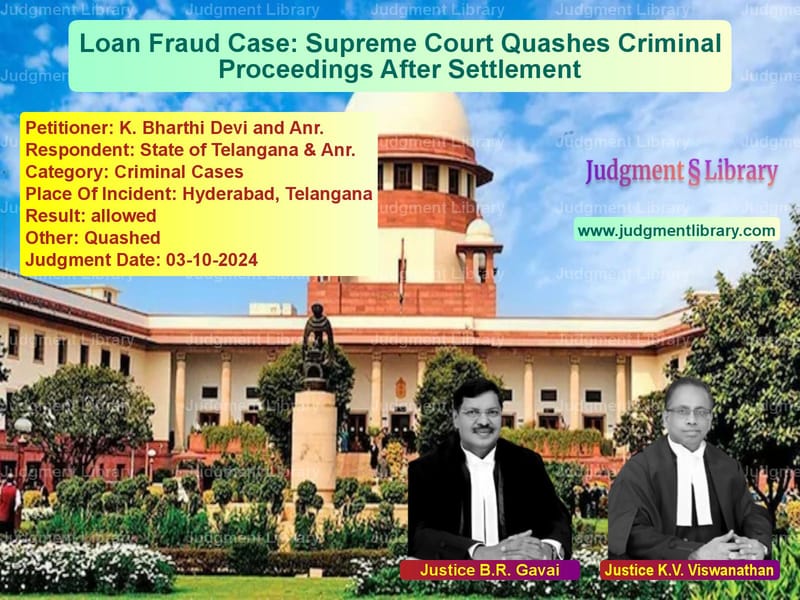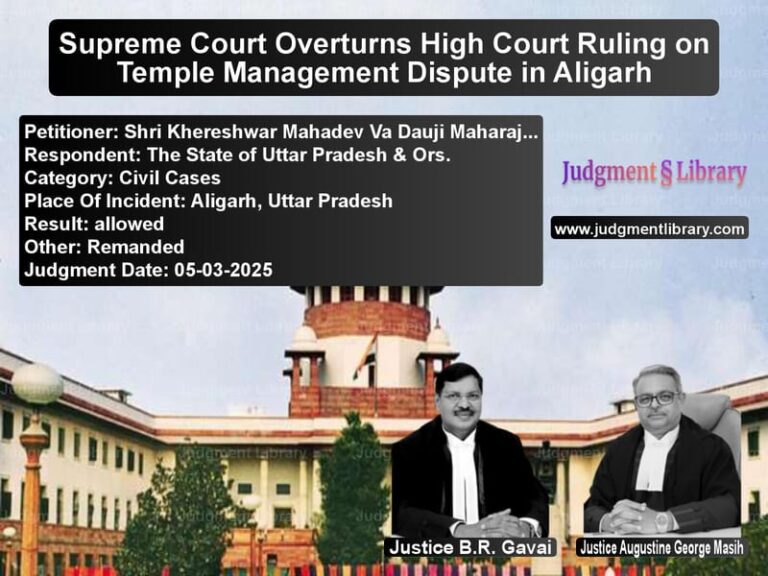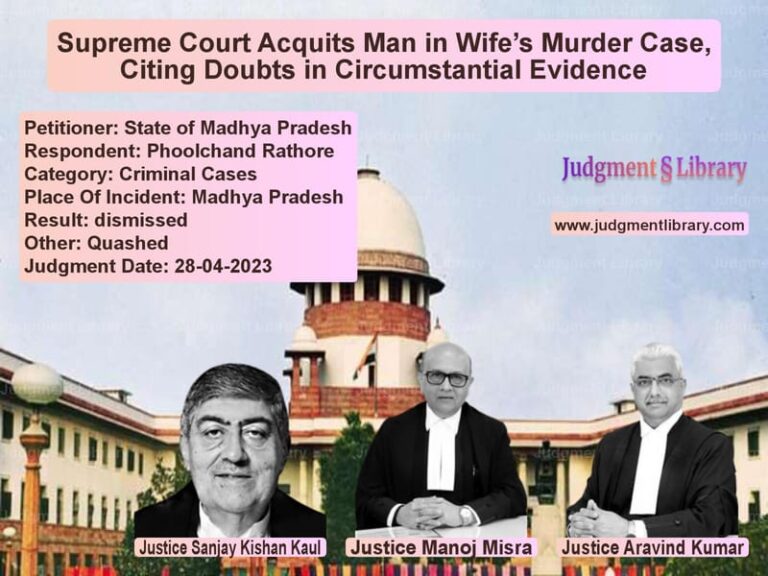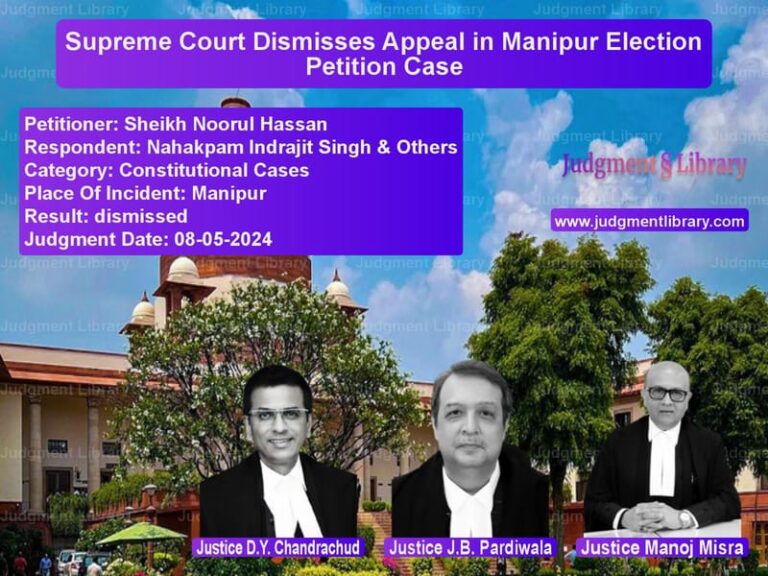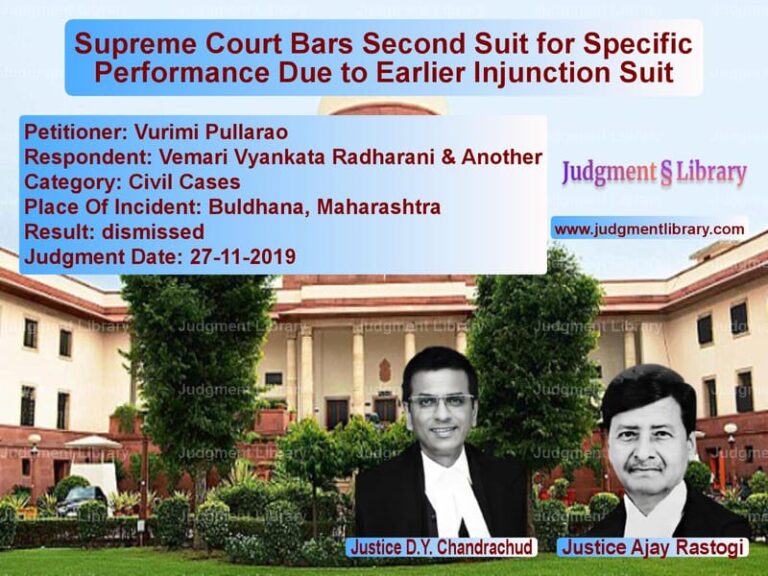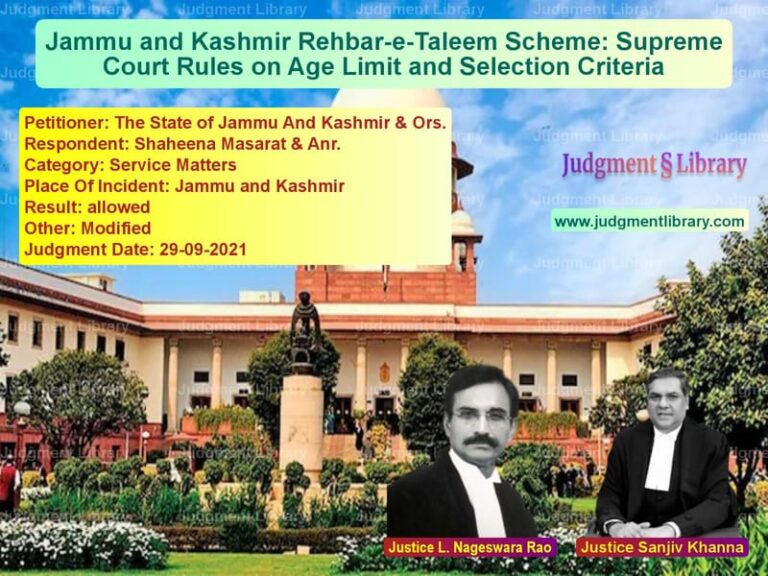Loan Fraud Case: Supreme Court Quashes Criminal Proceedings After Settlement
The case of K. Bharthi Devi & Anr. vs. State of Telangana & Anr. revolves around allegations of financial fraud against the borrowers of a bank loan. The Supreme Court was called upon to decide whether a criminal prosecution should continue when the disputed loan amount had already been settled between the parties. The Court ultimately ruled in favor of quashing the criminal proceedings against the appellants, emphasizing that civil disputes with financial overtones should not be unnecessarily criminalized when they are resolved amicably.
Background of the Case
The case originated from a financial transaction between the accused and Indian Bank, Osmanganj Branch, Hyderabad (referred to as respondent No. 2). The details of the case are as follows:
- K. Suresh Kumar (Accused No. 1) was the sole proprietor of M/s Sirish Traders, a firm engaged in processing Urad Dal.
- The firm was granted credit facilities by Indian Bank, secured by collateral provided by the accused, including the appellants (Accused Nos. 3 & 4).
- Due to non-payment, the loan account was declared a Non-Performing Asset (NPA) on 31st March 2010.
- To recover the outstanding dues, the bank filed an Original Application No. 253 of 2010 before the Debts Recovery Tribunal (DRT), Hyderabad.
- During the pendency of the DRT proceedings, the bank discovered that some of the title documents submitted for collateral were forged and fabricated.
- Subsequently, on 3rd September 2012, the bank lodged a written complaint, leading to the registration of an FIR No. RC.14/E/2012 by the Central Bureau of Investigation (CBI).
- After investigation, the CBI filed a charge-sheet on 27th December 2013, accusing the borrowers of offenses under:
- Sections 120-B read with 420, 409, 467, 468, and 471 of the Indian Penal Code (IPC).
- Sections 13(1)(d) and 13(2) of the Prevention of Corruption Act, 1988.
Key Legal Issues Considered
- Whether the criminal proceedings should continue after the accused had settled the dues with the bank?
- Whether the fraudulent nature of the transactions warranted prosecution despite settlement?
- Whether the accused, particularly the wives of the primary borrowers, had played an active role in the alleged fraud?
Petitioner’s Arguments
The appellants, represented by Senior Counsel Dama Seshadri Naidu, argued:
- The appellants were merely wives of Accused Nos. 1 and 2 and had no direct involvement in the alleged fraud.
- There was no active role attributed to them in the charge sheet.
- The bank had accepted a One-Time Settlement (OTS) of Rs. 3.8 crores on 19th November 2015, resolving the financial dispute.
- By 21st November 2015, the bank had issued a No Dues Certificate, indicating the closure of the loan account.
- The Debts Recovery Tribunal (DRT) also recorded the settlement on 4th May 2016 and disposed of the case.
- Since the financial dispute was settled, continuing the criminal proceedings would be an abuse of process.
Respondent’s Arguments
The prosecution, led by Additional Solicitor General Vikramjeet Banerjee, countered:
- The settlement with the bank does not absolve the accused of criminal liability.
- Forgery and fraud involving public money are serious offenses that impact society.
- Allowing settlements to quash criminal cases could set a dangerous precedent.
- Since the accused used forged documents to obtain credit, their prosecution was justified.
Supreme Court’s Observations
1. Criminalization of Civil Disputes
The Court acknowledged that while fraudulent financial transactions must be penalized, disputes with a predominantly civil nature should not be turned into criminal cases if they are resolved amicably.
“The disputes between the Company and the Bank have been set at rest on the basis of the compromise arrived at by them. The bank has received its dues, and the loan account has been closed. Continuing the prosecution would be an exercise in futility.”
2. Role of the Appellants
The Court observed that the primary allegations were against Accused No. 1 (K. Suresh Kumar). The appellants were merely guarantors and had no active role in committing the fraud.
3. Previous Precedents
The Court relied on past judgments, including:
- Nikhil Merchant v. CBI (2008) – Allowed quashing of criminal proceedings in a financial dispute settled between the parties.
- CBI v. Duncans Agro Industries (1996) – Held that a bank fraud case can be closed if a financial settlement is reached.
- Gian Singh v. State of Punjab (2012) – Stated that cases with a civil flavor can be quashed if a settlement has been reached.
Final Judgment
The Supreme Court ruled:
- Allowed the appeal and set aside the High Court’s decision.
- Quashed the criminal proceedings against the appellants.
- Reiterated that financial fraud cases with an overwhelming civil character should be treated differently.
Conclusion
The ruling in K. Bharthi Devi & Anr. vs. State of Telangana & Anr. underscores the importance of distinguishing between criminal liability and civil disputes. While financial fraud is a serious offense, cases where financial institutions have been fully compensated should not necessarily lead to prolonged criminal trials. The judgment reinforces the principle that settlements in commercial transactions should be given due weight in legal proceedings.
Petitioner Name: K. Bharthi Devi and Anr..Respondent Name: State of Telangana & Anr..Judgment By: Justice B.R. Gavai, Justice K.V. Viswanathan.Place Of Incident: Hyderabad, Telangana.Judgment Date: 03-10-2024.
Don’t miss out on the full details! Download the complete judgment in PDF format below and gain valuable insights instantly!
Download Judgment: k.-bharthi-devi-and-vs-state-of-telangana-&-supreme-court-of-india-judgment-dated-03-10-2024.pdf
Directly Download Judgment: Directly download this Judgment
See all petitions in Fraud and Forgery
See all petitions in Money Laundering Cases
See all petitions in Bail and Anticipatory Bail
See all petitions in Extortion and Blackmail
See all petitions in Judgment by B R Gavai
See all petitions in Judgment by K.V. Viswanathan
See all petitions in allowed
See all petitions in Quashed
See all petitions in supreme court of India judgments October 2024
See all petitions in 2024 judgments
See all posts in Criminal Cases Category
See all allowed petitions in Criminal Cases Category
See all Dismissed petitions in Criminal Cases Category
See all partially allowed petitions in Criminal Cases Category

